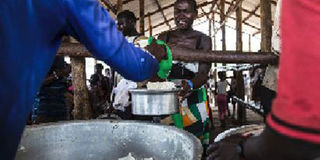Refugees facing food scarcity amid lockdown

Affected. Refugees line up for daily food rations at Palorinya Refugee Settlement in Moya last year. Refugees face food scarcity after lockdown. FILE PHOTO
What you need to know:
- Official. The World Food Programme Country director, Mr EL-Khadir Daloum, says Covid-19 has posed a threat to relief efforts.
- The 2019 Human Rights Watch Report titled “Congo, Forgotten: The numbers behind Africa’s longest Humanitarian Crisis,” indicates that more than 130 armed groups are fighting in eastern Congo’s Kivu province.
If it were only one meal a day, they would have got used to it. But now, the new dilemma of food cuts stares hard at them as Covid-19 brings the entire world nearly to its knees.
Refugees survived the war in their home countries but Covid-19 is another war without guns they have to overcome. They are not sure where they can seek another refuge to survive it.
Last month, more than 100,000 refugees in Kyaka settlement camp in Kyegegwa District received notification from their leaders that World Food Programme (WFP) would reduce food rations. The settlement has mostly Burundians, Rwandans and Congolese refugees.
Mr Kayana Dindo, a Congolese refugee with a family of 16, says he and his wife, two children, mother, four brothers, three sisters and other relatives survived the war in Democratic Republic of Congo by running to Uganda, but they are now scared of hunger and do not know where to run to for second refuge.
“The last awareness we had from Adventist Development and Relief Agency and WFP, everyone should get cash because food is not enough. The cash per person was Sh31,000. This month we are going to get Sh22,000 per person for one month. It is a big challenge. Even the Shs31,000 was not enough to buy food, charcoal or firewood and others,” Mr Dindo said.
The settlement has other refugees from North Kivu, Sud Kivu, Minembwe and Kisangani in eastern DR Congo.
The 2019 Human Rights Watch Report titled “Congo, Forgotten: The numbers behind Africa’s longest Humanitarian Crisis,” indicates that more than 130 armed groups are fighting in eastern Congo’s Kivu province.
This makes Congo a violent and unsafe place after more than 1,900 civilian deaths and more than 3,300 were abducted between June 2017 and June 2019.
Two weeks ago, some people were crying after hearing that food and cash would be reduced. They were asking to be taken back to die in their country.
A lady with seven children said even the food she was getting from WFP was not enough and has to get other food from a garden in the community such as maize, beans as they wait for the next distribution.
However, due to the current lockdown, movement has been restricted, and supplementary food is hard to get.
For those with some money, a family has to choose one member to buy food from a nearby market.
Mr Dindo said people are anxious about the uncertainty the Covid-19 has brought but they are also aware home is neither safe.
“In Congo, there is no peace right now, especially North Kivu. We get information from others on Facebook, WhatsApp, they show us how people are dying there,” he said.
His worry is if the refugees are given cash, domestic violence might increase because husbands resort to drunkenness.
Before Covid-19 struck, refugees used to get 2kg of beans, 12kgs of maize, and cooking oil per person monthly. In the settlement camp, one needs charcoal or firewood of about Sh1,000 to cook. Currently, essentials such as soap and salt are also hard to get.
The WFP Country Director, Mr EL-Khadir Daloum, admitted that Covid-19 has posed a threat to relief efforts.
He, however, said WFP is trying to continue supplying essential foodstuffs to the refugees.
“From April (this month), WFP will reduce both cash and food rations for refugees in all 13 settlements by 30 per cent because of insufficient funding. Refugees receiving food will continue to receive the food but it will be 5kg less (of cereals, beans and fortified vegetable cooking oil combined) than before. Refugees receiving cash will continue to receive cash reduced from Sh31,000 to Sh22,000 per person per month,” Mr Daloum said.
He, however, said refugees who arrived in the country not more than three months ago will receive full rations and WFP will continue to provide fortified food to treat malnutrition among children, pregnant and breastfeeding women.
Mr Daloum urged the refugees to use the limited resources sparingly.
“WFP is unable to meet the needs of all refugees. As we seek resources to provide the minimum dietary requirement of each refugee per day, other humanitarian actors provide non-food needs. However, WFP understands that the overall regional refugee response is underfunded and, therefore, refugees face difficulties on several levels.
“During this time of ration cuts and restricted movement related to Covid-19 outbreak, we encourage refugees to not sell their food or exchange it for other items for the sake of their survival,” he said.
Food programme
World Food Programme supports about 1.2 million refugees in the 13 refugee settlements in West Nile and southwestern Uganda.




